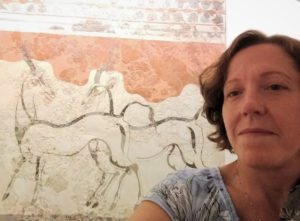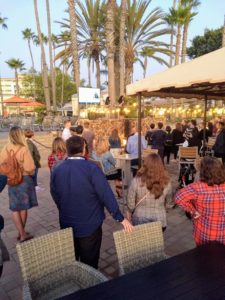 In November, with support from a GLAM Cross-Pollinator Registration Award, Dr. Joan E. Beaudoin attended the Museum Computer Network meeting in San Diego, California. We’re glad to share her thoughts about the conference below.
In November, with support from a GLAM Cross-Pollinator Registration Award, Dr. Joan E. Beaudoin attended the Museum Computer Network meeting in San Diego, California. We’re glad to share her thoughts about the conference below.
Dr. Joan E. Beaudoin (@joanebeaudoin) is an Associate Professor in the School of Information Sciences at Wayne State University in Detroit, Michigan. She teaches and performs research on metadata, information organization, digital libraries, digital preservation, museum informatics, and the access to and use of visual information. Prior to her appointment at Wayne State University she performed archaeological fieldwork, taught art history, and had a lengthy career in academic visual resources collections. Her research has been published in a number of scholarly journals, including the Journal of the Association for Information Science and Technology, Journal of Documentation, Journal of Academic Librarianship, Knowledge Organization, and Art Documentation, and she has presented her research at regional, national and international conferences.
Attending an MCN conference has been on my to-do list for a very long time and thanks to the DLF GLAM Cross-Pollinator Fellowship I was finally able to achieve this goal. The extensive conference program offered many options, and so I focused on attending sessions discussing collection data, collection systems, and descriptive practices in museums. I began the conference by attending a museum datathon session. The presenters gave overviews of the various data projects they had been involved in, and these provided a foundation for group work later accomplished by the session’s attendees. A surprisingly expansive view of museum data resulted from the interests expressed by the attendees. These included data literacy, data practices and standards, data ethics, data portability, cross-walking data sets, data visualization, human vs. machine created data, JSON to CSV conversions, and Wikidata. Clearly there is much to be explored when it comes to data among the museum community and these topics are creative fodder ripe for further treatment!

Sessions discussing collection systems and the records describing collection items brought to light several topics of current interest among the cultural heritage sector. These included the need to acknowledge the role that legacy systems and practices have played in the creation of collection data. For example, limitations in the fields of information included in a data record may be the result of the restrictive nature of the data model used to design the original system, while culturally insensitive language found in the collection data may be the result of terminology used at the time of the records’ creation which is now profoundly outdated. Several sessions discussed the impact of the approach taken in the descriptive process, and the limitations inherent in all acts of description. Museums take very seriously their charge to effectively manage their collections, and so descriptive item records are created and used by institutional staff with the primary focus of the collection data being performing this work. These same data, however, are also expected to be useful to audiences with diverse interests, needs, and terminology. When these competing forces upon collection data are combined with evolving systems and language, a much fuller picture emerges of the complexity behind the current state-of-the-art in museums. An additional topic of interest within the purview of collection data was a session on the exploratory use of AI by the Metropolitan Museum of Art to generate keywords for collection items. While lingering issues with the AI methods were noted by the presenters, their research results suggest future promise.
Other notable topics highlighted at the MCN 2019 conference, open access publishing, storytelling, data privacy, data hubs, user experience and human-centered design all made me feel as if I were among my information science colleagues. Beyond the familiarity of these topics, and the rich programming the conference offered, I also must acknowledge the many attendees who gave me such a warm welcome. I cannot think of a better way to round out my sabbatical this fall.
